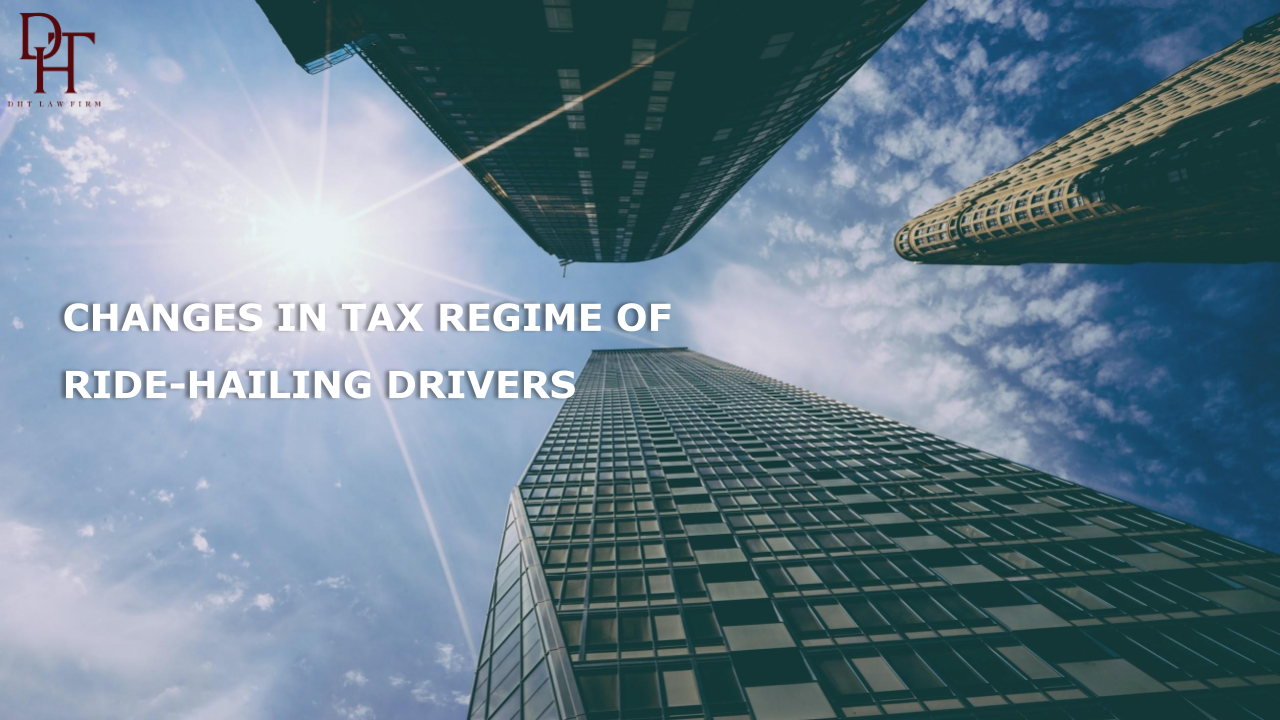
CHANGES IN TAX REGIME OF RIDE-HAILING DRIVERS
The Decree No. 126/2020/ND-CP guiding the Law on Tax Administration of the Government (hereinafter referred to as “Decree 126”) officially came into effect on December 5, 2020, in which, some new contents of this Decree attracted attention as well as raised many questions for the public, especially the Driver-Partners. Typically, Grab changed its new tax policy that applies to all driver-partners according to the guidance of the Tax Authorities.
Therefore, how much taxes are ride-hailing drivers obliged to pay now? Did Grab change the new tax policy in accordance with the law? The following article will clarify the taxes and tax calculation of ride-hailing drivers in accordance with applicable law.
Before learning about taxes of ride-hailing drivers, there are some legal issues should be clarified:
- Companies providing ride-hailing service are considered as transport businesses
In the past, ride-hailing firms such as Grab, GoViet (now Gojek),... were only considered as companies providing technology applications because of some reasons. First, companies themselves do not have cars that are used to transport goods and passengers; it means ride-hailing companies have no contractual privity with passengers. Second, these companies do not have labor contracts nor pay salaries to drivers. Drivers are not bound to perform services during set times nor even for a minimum amount of time. They are free agents and thus Grab does not have a supervisory relationship with them.
The companies have only provided technology for drivers to pick up passengers and provide services. Passengers have paid through the e-wallet connected to the ride-hailing apps or with cash. There is ambiguity in the legislation as to whether such payment policies create a customer-driver relationship, a customer-to-company relationship or both.
However, in Decree 10/2020/ND-CP issued on 17/01/2020 and is effective from 01/04/2020, the Government has issued new regulations according to that both traditional taxis and ride-hailing services are considered auto transport business. In addition, GrabCar is also defined as taxi business.
Thus, Grab and the companies providing ride-hailing service are regulated by the law as transport businesses instead of technology businesses.
- Are ride-hailing drivers employees or freelancers?
This is a controversial question. In the past, all Grab driver-partners were considered as businesspeople. However, Decree 10/2020/ND-CP regulates ride-hailing taxis similar to traditional taxis. Thus, GrabCar drivers are not considered as businesspeople. Along with that, passengers and companies like Grab will be linked together in transport contracts and the drivers and the companies are linked by other independent contracts.
For motorbike drivers like GrabBike, it is still understood in the old concept of businesspeople.
1. Value-added tax (VAT)
Regarding the VAT rate, before the new tax regime took effect, Grab drivers had complied with Circular No. 92/2015/TT-BTC dated 15/06/2015 and Official Letter No. 384/TCT-TNCN dated 8/2/2017, the VAT rate was 3%. The reason for this VAT rate was because the individual driver was considered as a businessperson (a partner of Grab) as well as a taxpayer. The actual income of drivers was calculated at 75% or 80% of the fare (without subtracting VAT payable). Therefore, they had to pay 3-percent VAT on their 75 or 80 percent, while the company only paid 10-percent VAT on its 20 or 25 percent income.
However, nowadays, with the provisions of Decree No. 10/2020/ND-CP along with Decree No. 126/2020/ND-CP, ride-hailing firms such as Grab, Be or Gojek are considered as transportation firms. Thus, the VAT rate of Grab drivers will be calculated similarly to the tax rates that other transport companies (e.g. traditional taxis) which are 10%. The controversial point here is that GrabBike drivers are also subject to the same 10% VAT rate as GrabCar drivers, meanwhile, motorbike drivers are still freelancers without entering into cooperatives like GrabCar (not Grab’s employees). Explaining this issue, at the meeting on December 9, 2020 between representatives of Grab Vietnam and the General Department of Taxation, tax authorities "self-affirmed" that the drivers were employees of Grab and did not have to pay VAT; that means the VAT liability belongs to Grab which is calculated on the total revenue. Grab was very disappointed with this result when it did not achieve positive outcomes; in addition, the General Department of Taxation did not have clear explanations and inconsistent arguments about the subject of VAT.
2. Personal income tax (PIT)
Grab drivers as well as other ride-hailing drivers’ PIT rate is unchanged after Decree No. 126/2020/ND-CP comes into effect. Currently, Grab drivers have to pay 1.5% of PIT on the total revenue received (after deducting VAT and distributing for Grab). If the driver's income is less than 100 million VND per year, this tax is not required. The new point here is that Grab will declare and pay the driver's PIT instead.
In addition, when the driver has a revenue bonus, they will be subject to 1% PIT.
According to Grab, 10% VAT and 1.5% PIT will be deducted together with the Application Usage Fee on each ride. The above new tax regime has received extreme opposition from Grab drivers that on December 7, 2020, hundreds of Grab driver-partners gathered at the representative office of GrabBike (Lane 78, Duy Tan street, Cau Giay district, Hanoi) to protest the new policy of increasing VAT from 3% to 10%. In addition, compared with the 3% VAT regulation as before, the actual income earned by Grab drivers will decrease significantly. Therefore, Grab immediately increased the cost of the ride from 11am on December 5, 2020.
